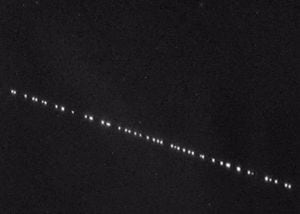Fear not – ‘aliens’ are just a night train in Shrewsbury sky
When a trail of lights were spotted in the night sky above Shrewsbury, people wondered whether the little green men were paying a visit.

But there is a much more scientific reason for the event which was spotted on Sunday evening.
The lights were part of the Satellite 'train', launched last November by billionaire Elon Musk.
Jennifer Williams saw the Starlink satellites from her home in Shrewsbury.
"At first I wondered what they were," she said.
"It did look a little eerie but then we Googled it and found out they were part of the SpaceX programme.
"The evening was so clear and we were able to see the stars really brightly so these stood out very well. It certainly provided a talking point."
Mark Le Coultre, saw the lights above Shawbury and said: "At approximately 6pm I went out to the front of the house. The night was littered with stars as usual there, being very little light pollution.
"The sky was cloudless and looking at the moon crescent I noticed to the far right of it a strange procession of what seemed like moving stars that were evenly spaced.
Impressive
"There seemed to be at least 30 of these lights at an extremely high altitude. Eventually I went to the rear garden to follow the path but there was no sign of it whatsoever.
"I know that it was not commercial aircraft because the single light as bright as a star on each moving object was not flashing."
So far this year, SpaceX has launched 60 new satellites into orbit and the 'train' is only visible for a couple of nights before the satellites spread out to their final orbits.
SpaceX launched the new Starlink satellites into a preliminary orbit of 174 miles (280 kilometres), but each has an ion engine to slowly raise its orbit to an altitude of about 217 miles (350 km).
While the Starlink satellites look impressive from the ground, astronomers are concerned they may interfere with the viewing of the constellations and the collection of data from the night sky.
According to current data from the United Nations Office for Outer Space Affairs, right now there are 5,162 objects orbiting Earth, of which roughly 2,000 are operational.
Therefore, the deployment of a network of 12,000 satellites would be unprecedented.
SpaceX has plans for an ambitious fleet of up to 12,000 satellites, with the goal to eventually create ultra-fast internet services around the world.
SpaceX is not alone in its satellite plans: Amazon is plotting its own Project Kuiper constellation, while communications company OneWeb is planning to launch 30 satellites into orbit in January next year.





